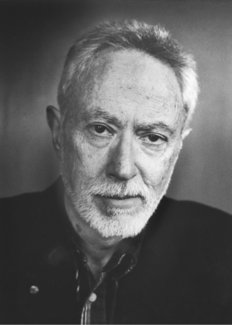J. M. Coetzee
Biographical

John Maxwell Coetzee was born in Cape Town, South Africa, on 9 February 1940, the elder of two children. His mother was a primary school teacher. His father was trained as an attorney, but practiced as such only intermittently; during the years 1941–45 he served with the South African forces in North Africa and Italy. Though Coetzee’s parents were not of British descent, the language spoken at home was English.
Coetzee received his primary schooling in Cape Town and in the nearby town of Worcester. For his secondary education he attended a school in Cape Town run by a Catholic order, the Marist Brothers. He matriculated in 1956.
Coetzee entered the University of Cape Town in 1957, and in 1960 and 1961 graduated successively with honours degrees in English and mathematics. He spent the years 1962–65 in England, working as a computer programmer while doing research for a thesis on the English novelist Ford Madox Ford.
In 1963 he married Philippa Jubber (1939–1991). They had two children, Nicolas (1966–1989) and Gisela (b. 1968).
In 1965 Coetzee entered the graduate school of the University of Texas at Austin, and in 1968 graduated with a PhD in English, linguistics, and Germanic languages. His doctoral dissertation was on the early fiction of Samuel Beckett.
For three years (1968–71) Coetzee was assistant professor of English at the State University of New York in Buffalo. After an application for permanent residence in the United States was denied, he returned to South Africa. From 1972 until 2000 he held a series of positions at the University of Cape Town, the last of them as Distinguished Professor of Literature.
Between 1984 and 2003 he also taught frequently in the United States: at the State University of New York, Johns Hopkins University, Harvard University, Stanford University, and the University of Chicago, where for six years he was a member of the Committee on Social Thought.
Coetzee began writing fiction in 1969. His first book, Dusklands, was published in South Africa in 1974. In the Heart of the Country (1977) won South Africa’s then principal literary award, the CNA Prize, and was published in Britain and the USA. Waiting for the Barbarians (1980) received international notice. His reputation was confirmed by Life & Times of Michael K (1983), which won Britain’s Booker Prize. It was followed by Foe (1986), Age of Iron (1990), The Master of Petersburg (1994), and Disgrace (1999), which again won the Booker Prize.
Coetzee also wrote two fictionalized memoirs, Boyhood (1997) and Youth (2002). The Lives of Animals (1999) is a fictionalized lecture, later absorbed into Elizabeth Costello (2003). White Writing (1988) is a set of essays on South African literature and culture. Doubling the Point (1992) consists of essays and interviews with David Attwell. Giving Offense (1996) is a study of literary censorship. Stranger Shores (2001) collects his later literary essays.
Coetzee has also been active as a translator of Dutch and Afrikaans literature.
In 2002 Coetzee emigrated to Australia. He lives with his partner Dorothy Driver in Adelaide, South Australia, where he holds an honorary position at the University of Adelaide.
This autobiography/biography was written at the time of the award and later published in the book series Les Prix Nobel/ Nobel Lectures/The Nobel Prizes. The information is sometimes updated with an addendum submitted by the Laureate.
Nobel Prizes and laureates
Six prizes were awarded for achievements that have conferred the greatest benefit to humankind. The 14 laureates' work and discoveries range from quantum tunnelling to promoting democratic rights.
See them all presented here.
